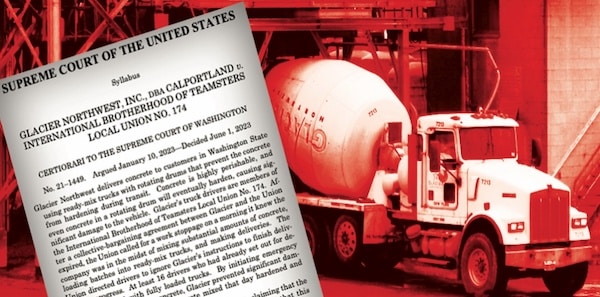By an 8-1 vote, the right-wing-dominated U.S. Supreme Court has curbed the right of the nation’s workers to strike by allowing companies to sue unions in state courts whenever they wish for alleged “damage” strikers cause, overruling the National Labor Relations Board even if it is already investigating and handling the dispute.
It is no surprise to the labor movement and its allies that a Court that, for the first time in history, took away a constitutional right by killing Roe v. Wade, would continue its right-wing crusade by beginning to chip away at the sacred right of all Americans to withhold their labor to make gains or to protect themselves on the job. The only dissenting justice, Ketanji Brown Jackson, warned that the ruling moved in the direction of ushering in indentured servitude across the nation. She declared that her colleagues misread the primacy of U.S. labor law and that the ruling indeed would allow turning workers into indentured servants.
Somehow, lawmakers and judges act as if labor law is not “real” law, allowing themselves to deny, for example, that the encouragement of collective bargaining is the legal, lawful policy of the United States government under the terms of the National Labor Relations Act. Justice Jackson is apparently the only judge on the Supreme Court who recognizes that adhering to U.S. labor law is as much a requirement as adhering to any other law.
Justice Jackson made her opposition to the ruling known in blunt remarks after the Court released its decision:
The ruling places a significant burden on the employees’ exercise of their statutory right to strike, unjustifiably undermining Congress’s intent. Workers are not indentured servants, bound to continue laboring until any planned work stoppage would be as painless as possible for their master.
The decision in Glacier Northwest v. Teamsters Local 174 outraged Teamsters President Sean O’Brien and Association of Flight Attendants-CWA President Sarah Nelson. AFL-CIO President Liz Shuler predicted that when the case will be tried over again in Washington state, the union will win.
Under current law, strikes are legal under the National Labor Relations Act unless there is deliberate property damage, violence or both. In plain English, the justices in the majority took away the word “deliberate,” letting bosses sue unions for any alleged damage strikes cause. It would open the door to company agents themselves causing damage and then blaming it on workers or their unions.
“It’s like putting a tax on the right to strike,” Harvard labor law professor Sharon Block, a former NLRB member, told CBS’s business channel.
In the six-year-old case, Glacier, a cement company, sued Local 174 for striking and letting cement in trucks dry in Glacier’s yard, costing it $100,000 in damage to the trucks, plus lost business. Local 174 denied the charges, saying the workers ensured the cement truck drums were still spinning, keeping cement wet, when they left. It called Glacier’s suit retaliatory labor law-breaking.
The NLRB General Counsel agreed and took over the case, but Glacier went to Washington State Supreme Court to argue it could sue the local for damages. That court threw that case out, saying federal law pre-empted Glacier’s damages try. The U.S. Supreme Court majority didn’t.
“By reporting for duty and pretending as if they would deliver the concrete, the drivers prompted the creation of the perishable product,” the cement, Trump-named Justice Amy Coney Barrett wrote, swallowing the company’s line.
Then, they waited to walk off the job until the concrete was mixed and poured in the trucks. In so doing, they not only destroyed the concrete but also put Glacier’s trucks in harm’s way.

Supreme Court Justice Ketanji Brown Jackson was the only member of the court to dissent and side with the workers. | AP
Because they did so, in her lengthy retelling of the dispute, Glacier could sue the local for damages. The ruling reverses precedents and opens the floodgates to similar expensive lawsuits by firms against striking unions. AFA-CWA’s Nelson said the decision could lead to more militancy.
“If the Supreme Court interferes with the already limited right to strike, it’s going to create even more instability in the workplace,” Nelson predicted at the end of a zoom press conference on another strike issue.
They have to respect this human right or workers will take it into their own hands.
There will simply be a breakdown in the law. We will see a lot more strikes.
O’Brien said the ruling showed the court’s tilt towards the corporate class and the “billionaires …they socialize with at cocktail parties and who they owe their jobs to in the first place.” The justices “are not upholding the law,” he added.
“American workers must remember their right to strike has not been taken away. All workers, union and nonunion alike, will forever have the right to withhold their labor. The Teamsters will strike any employer, when necessary, no matter their size or the depth of their pockets,” he promised.
Unions will never be broken by this court or any other. Today’s shameful ruling is simply one more reminder the people cannot rely on their government or their courts to protect them. They cannot rely on their employers. We must rely on each other.
Shuler predicted that in a rerun of the company’s case in Washington state courts, the union would win. Her statement did not touch the wider issues Block, Nelson and Justice Jackson raised.
“The Supreme Court unnecessarily gave the employer another bite at the apple” by relying on “unfounded allegations in the employer’s complaint that the union intended to damage the cement trucks when it called the strike,” Shuler said.

